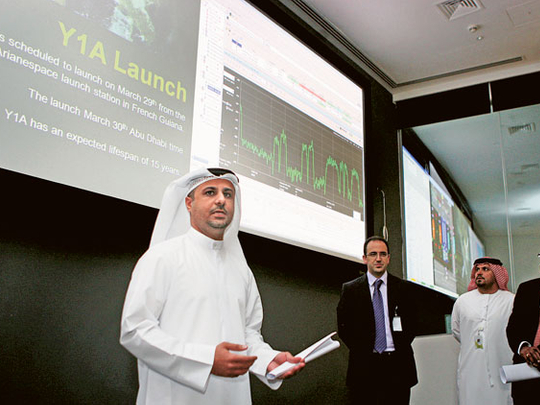
Abu Dhabi: Thirty kilometres outside the city of Abu Dhabi sits a brand new satellite control centre that's only days away from having its operations take off.
Built by Yahsat, the Abu Dhabi-based satellite communications company, this control centre is gearing up for the launch of its first satellite this month.
Yahsat's Y1A satellite is so far on schedule to be launched on March 30, Abu Dhabi time, from the Arianespace launch station in French Guiana.
In 2007, Yahsat signed a $1.6 billion (Dh5.87 billion) contract with EADS/Thales Alenia Space for two satellites, their related network management systems and the ground segment.
Y1A, in addition to Y1B, which will be launched during the first quarter of 2012 from Kazakhstan, will cover the Middle East, Africa and Southeast Asian areas providing commercial services such telecommunication and TV broadcasting as well as secured communication services for the UAE Armed Forces.
Major project
"This is a big project for us, for Yahsat, for Yahsat shareholders, for Mubadala and for Abu Dhabi as a country. This will enable our government and the UAE to have satellite capabilities," said Jasim Al Za'abi, CEO of Yahsat, to reporters at the control centre yesterday. "The pride we take as a team is being able to operate this system in house."
Based on statistical research by Arianespace, there is only a 15 per cent chance that a satellite is launched on its first set date, said Martin Gee, Chief Technical Officer at Yahsat.
"Key things to be aware of is that it is state of the art proven technology, but a lot of complex technologies have to come together for the successful mission," Gee said.
Y1A will be the 58th Ariane 5 launch, the launch system that puts spacecraft into the geostationary orbit. The last Ariane 5 launch failure was in 1996, Gee said.
So given that there are risks, Y1A is insured for $600 million in case a launch failure occurs, he added.
If March 30 remains on schedule, there will be a window of 95 minutes to launch Y1A.
Once launched, the satellite will take approximately 30 minutes to be completely separated from the rocket. For the following nine days the satellite will be controlled by Yahsat staff in France.
"We will have staff there monitoring it," Gee said. "After that nine days, that global network is switched off and we transfer the commanding and all communications with the spacecraft to our own antennas here."
The satellite will go into orbit almost 35,786 kilometres above the Earth, which is roughly one tenth the distance to the moon, with an orbital speed of 3.07 kilometres per second.
Y1A will also be sharing the launch with another spacecraft for Intelsat and both spacecraft should be coming together on March 15.












